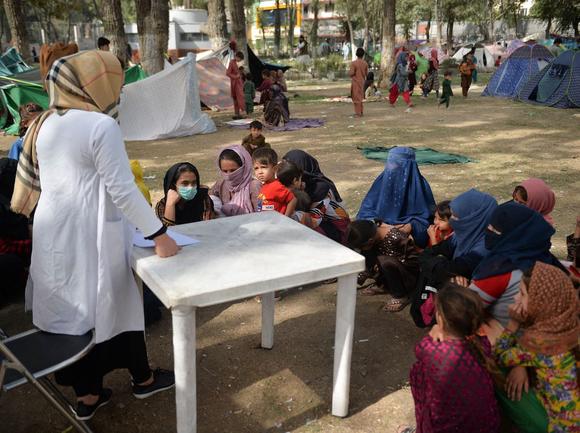Donors have pledged more than $1.1 billion in aid for Afghanistan, where poverty and hunger are spiraling as foreign grants have dried up since the Taliban’s takeover last month.
The pledges were made at a UN conference in Geneva as the world body has warned of a looming humanitarian crisis in the South Asian country.
China and Russia said the main burden of helping Afghanistan out of crisis should lie with Western countries.
“The US and its allies have a greater obligation to extend economic, humanitarian, and livelihood assistance,” said Chen Xu, China’s ambassador to the United Nations in Geneva.
The United States pledged $64 million in new assistance at the conference, while Norway pledged an extra $11.5 million.
France also said it will contribute $118 million to the UN’s flash appeal.
Neighbors China and Pakistan have already offered help. Beijing promised $31mn worth of food and health supplies and said it would send the first batch of three million coronavirus vaccines.
Pakistan Foreign Minister Shah Mahmood Qureshi, whose country, like other neighbors, would bear the brunt of any exodus of refugees said, “Past mistakes must not be repeated. The Afghan people must not be abandoned.”
“Sustained engagement with Afghanistan in meeting its humanitarian needs is essential,” he noted.
Around $200 million of the new money is earmarked for the UN World Food Programme (WFP), which found that 93% of the 1,600 Afghans it surveyed in August and September were not getting enough to eat.
WFP Executive Director David Beasley said, “Fourteen million people, one out of three, are marching to the brink of starvation. They don’t know where their next meal is,” Beasley said.
“If we are not very careful, we could truly, truly enter into the abyss in catastrophic conditions, worse than what we see now.”
Beasley said 40% of Afghanistan’s wheat crop had been lost, the price of cooking oil had doubled, and most people anyway had no way of getting money.
Read More: A prosecution witness in ex-Israel PM corruption trial killed in a plane crash
WFP Deputy Regional Director Anthea Webb also said, “It’s now a race against time and the snow to deliver life-saving assistance to the Afghan people who need it most.”
UN Secretary-General Antonio Guterres said that Afghans are facing “perhaps their most perilous hour” after decades of war and suffering.
“The people of Afghanistan are facing the collapse of an entire country — all at once.”
The UN chief warned that food could run out by the end of this month.
The government of Afghanistan rapidly collapsed on August 15 and president Ashraf Ghani fled the country in the face of the lightning advances of the Taliban that followed US President Joe Biden’s decision to withdraw the American troops in a disastrous pullout.
On September 7, the Taliban announced the formation of a caretaker government. The group first ruled Afghanistan from 1996 to 2001 until the United States invaded the country and toppled the Taliban-run government in 2001 on the pretext of fighting terrorism following the September 11 attacks in the US.
Western countries and international financial organizations suspended aid to Afghanistan, depriving it of billions of dollars needed to finance vital food imports, as the Taliban has not been recognized by the international community.
Guterres noted that it would be “impossible” to provide humanitarian aid inside Afghanistan without engaging with the Taliban.
Even before the Taliban’s takeover of Kabul, 18 million Afghans, half of the country’s population, depended on aid.
The UN World Health Organization, which is part of the appeal, seeks to shore up hundreds of health facilities at risk of closure after grants were suspended.
WHO director-general Tedros Adhanom Ghebreyesus said that gains made towards eradicating polio and vaccinating against COVID-19 could unravel.
The International Organization for Migration also said the Afghan medical system was “on the verge of collapse.”

